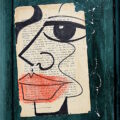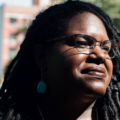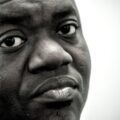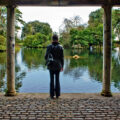Escapes; or, the Easiest Terrain
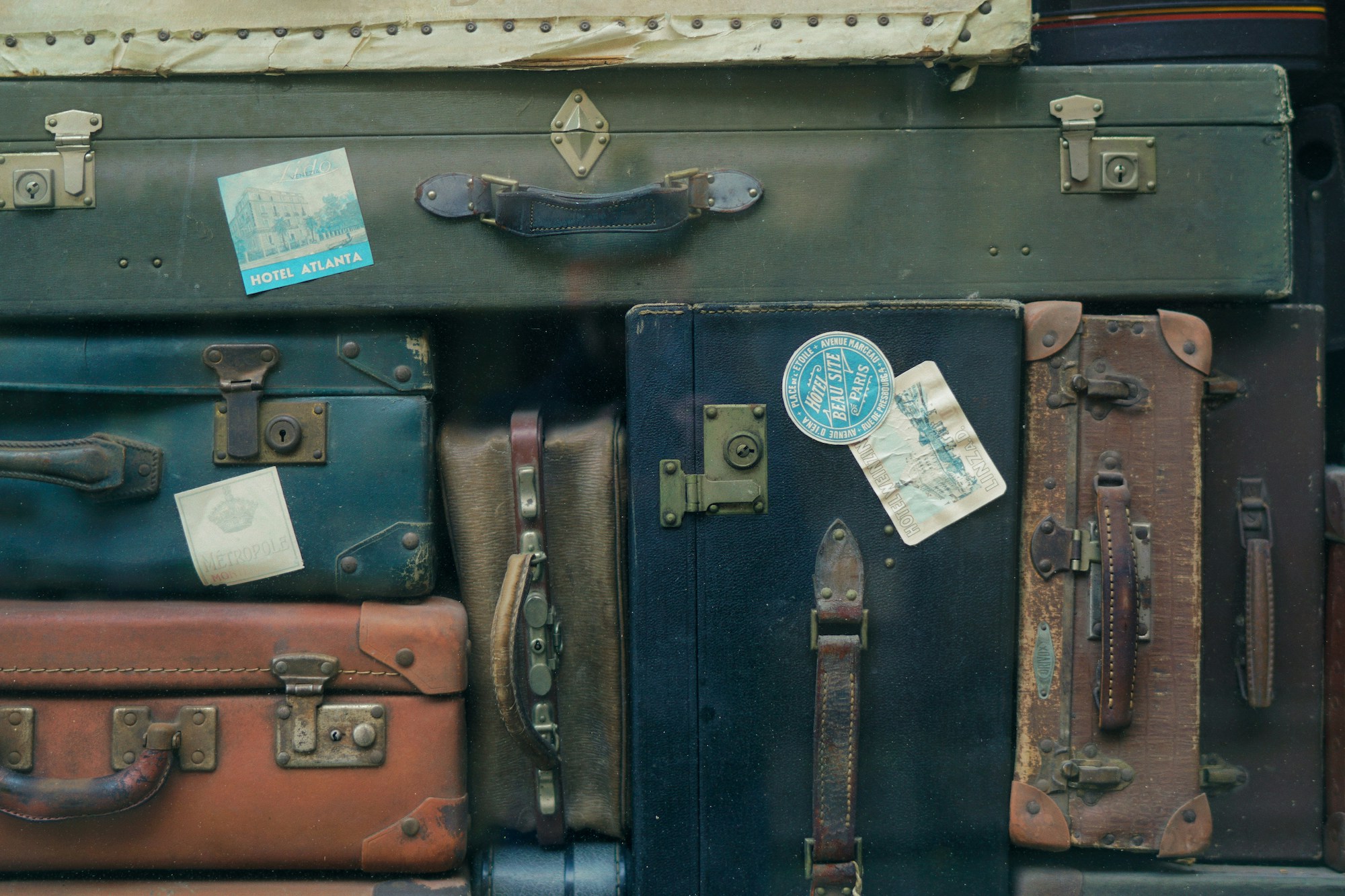
Walking through Paul Bowles’s house in Tangiers, past battered suitcases stacked against a wall and a simple typewriter on a basic black table that faced a window looking out to the sea, my nostalgia for living abroad, for being what I had used to call “an expatriate” returned with an unexpected force.
It had been over ten years since I’d returned to the States, settling in Tennessee, and although I still traveled abroad for work or visiting family who lived in South Africa and Turkey, I no longer dreamed of living elsewhere. But in this house, away from my job, from my problematic country, from those I loved, I envied Bowles’s freedom, his solitude, the simplicity of his life. In one of my favorite passages from Bowles’s most famous novel The Sheltering Sky, the protagonist’s Port’s life abroad is criticized and envied by his encumbered friends.
How many times his (Port’s) friends, envying him his life, had said to him: “Your life is so simple.” “Your life seems always to go in a straight line.” Whenever they had said the words he heard in them an implicit reproach: it is not difficult to build a straight road on a treeless plain. He felt that what they really meant to say was: “You have chosen the easiest terrain.” But if they elected to place obstacles in their own way—which they clearly did, encumbering themselves with every sort of unnecessary allegiance—that was no reason why they should object to his having simplified his life. So it was with a certain annoyance that he would say: “Everyone makes the life he wants. Right?” as though there were nothing further to be said.
I lived in South Korea for twelve years, which enabled me to live the uncomplicated life I wanted then. I felt free from the constraints of my society but not bound by the one I lived in, free from the burdens of home and car ownership, free from worrying about violence, free from the relentlessly American solipsism that was as present in the States as breathing air.
For the first four years, I lived with my then-husband in various one-bedroom furnished apartments whose rent was paid by the institutions we worked for. Then I took a job at a university in the heart of Seoul. I was in my mid-thirties and “back home,” a majority of my demographic had gotten married, were buying houses, and having children. I didn’t envy them. It never occurred to me that my tiny apartment, my lack of ownership of a home or a car, and my childlessness, were anything but freedom. I loved my students. I loved traveling five months of the year. I loved seeing places I’d never even heard of when I was growing up.
Even in early 2002, when my marriage suddenly and spectacularly imploded, when I, thirty-eight, had a chance to reverse course, to return to the United States, perhaps meet someone, have a child, buy the house, the car, the appliances, even then, alone and single in a country that I would always be a visitor in, I didn’t want to move back. I still wanted the life I’d made, simple, unencumbered yet expansive and rich.
Now, remarried, encumbered with long-term relationships, a house, a car, a “career,” I wandered Bowles’ house and felt a tug for that time when I had few attachments.
During World War II, as planes flew overhead and my dad worked in the Arkansas fields, he would look up and wonder where those planes were flying, and imagined going there himself.
My dad graduated from high school early, a sixteen-year-old valedictorian. But the partial scholarship he was awarded to the nearby Monticello college still wasn’t enough to cover transportation, books, and the remaining tuition. He saw joining the Navy as his only way out of Possum Valley and used the GI Bill to fulfill another dream, which was to earn his college degree.
My dad kept a scrapbook of photos from that time and a small diary he’d bought in China of the locations his ship went to. When I look at those photos of that time, perhaps because he’s in the Navy uniform, or maybe because his hairline is already receding, or because the photos are in black and white and the one that isn’t has that washed out colorized look to it, my dad looks older than his years. In many ways, he was. He had grown up working on the family farm, living through the Depression and World War II. It had been hard but not desperate.
It’s hard to imagine what my dad thought when he landed in San Diego for boot camp, or as he boarded his ship for Pearl Harbor, or when they traveled to Guam; the Philippines; Shanghai, Tsingtao, Yokosuka, Tokyo, Hong Kong, Saigon, Okinawa, and Sasebeo. Each place must have felt more defamiliarizing than the last, nothing like home.
While living abroad enabled me to abandon the American middle-class trajectory—stable job, house, children, my dad’s time in the Navy allowed him to embrace it. For me, that suburban life represented Thoreau’s life of quiet desperation. For my dad, it was the opposite. It was his escape, a promise for a more expansive life.
During my twelve years in Korea, I didn’t think about how my “simple life” was only possible because I was a living part of America’s vast global empire. I didn’t think much about the ways the location and timing of my birth allowed me to be there, or how much I benefited from the United States’ relatively soft power and its global hegemony. It was that brief set of years some people had termed “the end of history” (although learning about the rise and fall of Asian empires, I at least knew better than to believe that). I was a White conventionally attractive American woman who taught a language native inhabitants were forced to learn to “get ahead,” a woman whose own nation still occupied the land, making possible my escape.
That military occupation went back to my father’s naval career during the Korean War. Although my father never stepped foot on Korean soil, his ship, the USS Stickell, according to Wikipedia, “conducted shore bombardments of the Songjin–Wonsan area and patrolled the waters off Shingjin, Yong-do, and Chongjin for enemy small craft. In addition, she landed Republic of Korea intelligence teams on hostile shores and she rescued three air crewmen while on lifeguard duty for the carriers.” Later as my dad’s notes confirm, “Stickell not only blockaded Hŭngnam, but also delivered interdiction and shore bombardment fire.”
I don’t know what my dad felt about the United States after his five years in the Navy, many of those in Asia, some of those in a war. As an American and a Christian, my dad must have spent a lot of energy on the cognitive dissonance of what he saw, but he never spoke of it. I remember my dad remarked that when he was in the Navy, he’d never seen such poverty as in China. It was, he said, a very different type of poverty than the “country poor” he’d grown up with. What he saw in China was a complete disregard for human life, a place where he saw dead bodies in the streets. I remember him saying he’d felt sympathetic to Mao—nothing he thought could be worse than what he saw under Chiang Kai Shek’s rule, which was, we know now, made possible in part by United States support.
Despite his own poverty, my dad grew up sheltered. His family, in the end, were still White people in the United States who owned property and were respected in a tight-knit community committed to mutual aid. He was not the child of tenant farmers or addicts or itinerants, who often lead lives of instability and desperate poverty. My dad had food, shelter, stability, and an extended family, a community, and was growing up in a country that was improving by many metrics.
In 1999, my dad returned to China and Korea with my mom to visit. They flew into Seoul where a former student of mine met them at the airport, brought them to dinner, and checked them into their hotel room. My husband and I, who had been traveling from Vladivostok to Lake Baikal to Mongolia to Beijing by Siberian Express, met them and my in-laws in Beijing. We took a private guided tour around the city, which included the Great Wall, the Forbidden Palace, some temples, an evening of acrobatic performance, and a visit to a traditional medicine facility.
At that facility, traditional medicine doctors looked at our tongues, took our pulses and checked our overall health. I remember that the doctor said that my dad’s system was weaker (perhaps they even mentioned his heart), and that my mom, who they said was in excellent health, would need to watch and take care of him.
While I respected traditional medicine, I was skeptical of the diagnosis. It was, after all, part of a guided tour. We dismissed the doctor’s concerns.
Six months later, my dad had a heart attack. Those doctors had been right.
Thinking back, I’m a little embarrassed at the paces we put our sixty-something parents through on that trip. We stayed in middling traveler hotels, took the one-cent city buses that careened around Beijing instead of taxis or even semi-private vans, ate at side-road restaurants, and didn’t ever offer them the option of eating Western cuisine. They had to use the squat toilets, which were still common at that time, and which sometimes were not much more than a hole in the ground. (My dad said he’d hold onto the plumbing pole for dear life, hoping he’d not fall in.)
Back in Korea, we traveled by train and bus, and we slept one night at a “love hotel” that had large neon hearts on the front. We visited a former student’s parents’ farm and spent the night there, where women slept on yos in one large room, a mosquito net draped above us, the men in another. At the farm we spent an hour helping the family pick the red peppers that were ready for harvesting. My dad seemed to thrive in these environments, glad to be away from air-conditioned buses and packaged tours, which he generally hated.
I don’t remember asking him then what he thought of China and Korea. It had been fifty years. He of course knew of and expected changes and growth, but I imagine witnessing those changes through his eyes, the modernity and peacefulness and relative wealth of both places, that still retained their culture, was beyond any young man’s 1949 imagination of what the future might be.
Many Koreans, the ones who had ambitions to work at the chaebols as salarymen or in government or in universities, were desperate to learn English from “native speakers.” I made extra money by editing scientific papers by Korean professors working at the top universities, universities I never would have been accepted into if I’d been born there, because they had to publish their work in English publications. That I arrived in Korea young(ish), conforming to ideals of Western attractiveness (Korean women told me they envied my “small head”) and was married to a dark haired equally attractive-conforming man gave us a social cachet to certain Koreans. That we were interested in learning about and traveling around Korea and took the time to study the language ingratiated us even more.
We prided ourselves in not being like other Westerners, the ones who criticized Koreans and their culture yet didn’t even bother to learn the language except to say, “mekju joosayoh” (beer, please). We felt superior to those Westerners who frequented expensive Western-style or fast-food restaurants instead of Korean mom and pop restaurants, those who didn’t bother to travel around the country or learn much about the place they lived.
I didn’t think a lot about why my friends from Western countries and I considered ourselves “expats,” even as people who came from South Asian countries to work were considered migrants, immigrants, or refugees. But by 2005 I began to understand that the word “expatriate” was problematic. In an essay published that year, I wrote:
Since the ‘70s, for an American to call himself an expatriate sounds anachronistic at best and pretentious and antagonistic at worst. Baldwin, who for a long time considered himself an expatriated exile from the States, later referred to himself as a “commuter,” as if even he was ready to claim, at least partially, his tie to the United States. In his 1994 essay “How I got Over,” Darryl Pinckney also eschews the term “expatriate” saying, “When pressed I call myself nomadic because I move from country to country on a fixed cycle during the year.”
Since then, other writers have also pointed out the problems with this term. There was even a recent miniseries that explored the question, “Expats.” I found the issue worth addressing again in 2014,
Today the term expatriate sounds distastefully antiquated and colonialist. As people voluntarily shuttle between and among countries, their values connect them to ways of living rather than the nation-states’ terms. As a result, they more often refer to themselves as transnationals, global citizens, and third cultures than expatriates.
While the word “expatriate” to me is a useful literary term to define a group of specific self-identified writers from the first half of the twentieth century, contemporary expatriates were usually associated with current and former English-speaking empires. It grew to become an uncomfortable epithet for me, a word that tidily papered over too much discomfort, one designed to stifle critical self-awareness and personal growth.
Although I may not have been aware enough of my own complex position in Korea, being away from the States for those years enabled me to see my own country anew, in the context of its global maneuvers. Traveling to places I’d never even imagined—Mongolia, Burma, Indonesia, and many others—only illuminated the insularity and myopia of many Americans, including myself.
It was in Korea that I first saw myself as White, undermining the default “raceless” position I’d assumed in the States. In Korea, I met and mingled with people from different ethnicities, races, and classes in ways I had never done in the States. The small world of being “the foreigner” forced me to desegregate from my more comfortable bubbles defined by class, geography, political beliefs, and education.
I experienced first-hand that the “American Way” was certainly not the only or best way. Whenever I returned to the US for a visit during those years abroad, the racial and economic inequalities, the garish displays of wealth through McMansion neighborhoods and oversized cars, the overconsumption of goods, of food, and the lack of pedestrian friendly centers stood out in stark relief to the world I lived in, as a modern dystopia.
In my case, Port was right. I did make the life I wanted, and the life I wanted was one that required me to reckon with my and my country’s past, to face it, and in some small way, to find who or what it was that needed reconciliation.
About Sybil Baker
Sybil’s most recent novel Apparitions, received the IPPY Gold Medal for short fiction. She is the author of five works of fiction, which have won Eric Hoffer, Foreword, and IPPY awards. Her nonfiction work, Immigration Essays, was the 2018-2019 Read2Achieve selection for the University of Tennessee at Chattanooga and required reading for all first-year students. Her work has appeared in a variety of publications including Guernica, Electric Literature, Glimmer Train, and The Critical Flame. She was awarded two MakeWork Artist Grants and a 2017 Individual Artist’s Fellowship in nonfiction from the Tennessee Arts Commission. She is a professor of English at the University of Tennessee and Chattanooga, Director of the Meacham Writer’s Workshop, and on faculty for the Yale Writer’s Workshop.


